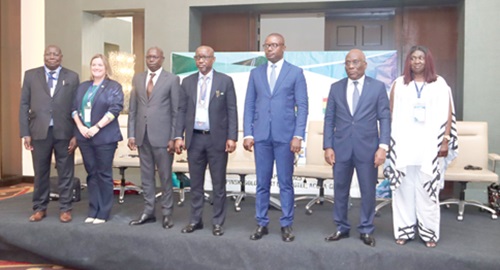The Minister of Energy and Green Transition, John Abdulai Jinapor, has assured members of the public and businesses that steps are being taken to address challenges facing the country’s energy sector to ensure a reliable and affordable power supply.
Speaking at a West African Gas Pipeline Project (WAGP) meeting, Mr Jinapor said under the directive of President John Dramani Mahama, he was working closely with the relevant stakeholders and putting in place policy measures that would address the financial and technical issues that were negatively affecting the energy sector.
For instance, he said, Cabinet had approved the establishment of a second gas processing plant in the country as a long-term measure to switch from the overdependence on liquid fuel, which was costlier compared with gas.
The government was also working closely with all stakeholders to deal with the $80 billion energy sector debt.
"So, I want to appeal to Ghanaians and the general consuming public to bear with the government as difficult decisions are being taken to resolve the current energy challenges.
"We are committed to ensuring stable, reliable, uninterrupted and sustainable energy sources for our economic development," Mr Jinapor stressed.
The Yapei Kusawgu Member of Parliament (MP) made the call at the opening session of the ordinary meeting of ministers under the West African Gas Pipeline Project (WAGP) in Accra yesterday.
The meeting brought together the four countries under the WAGP — Ghana, Togo, Benin and Nigeria to reflect, deliberate and explore efficient ways of harnessing the potential of the WAGP project.
Present at the meeting were the Ministers of State for Petroleum Resources (Gas), Nigeria, Ekperikpe Ekpo; Energy, Water and Mines of Benin, Paulin Kingnide Akponya; Mines and Energy Resources, Togo, Paul Mawusi Katatsi, and other dignitaries.
WAGP key
WAGP project consists of a pipeline system (681 km long) that transports natural gas from Nigeria to Ghana, Togo and Benin for power generation and eventually other uses.
Mr Jinapor said the WAGP was critical to the government's quest to get reliable and cheaper source of energy to avoid the heavy dependence on liquid fuels, which were so expensive.
“This year alone, we estimated that $1.2 billion is required to procure liquid fuel, but when we use gas, that will save us about 50 per cent to 60 per cent of the cost of liquid fuel.
“If we had a gas processing plant, it means that we would have been saving about $600 million this year alone, and that amount is enough to build the gas processing plant,” he said.
Efficiency
Mr Jinapor said that although the country was experiencing over 500 megawatts (MW) of load shedding as of December 2024, the government had been able to reduce that deficit significantly.
Nevertheless, the Energy Minister said, the country was still having some challenges “which we are working on to address in the coming weeks.”
He added that the country lost more than $1 billion every month from the inefficiencies in the power sector relating to technical, collection and commercial losses, and the non-alignment of a tariff structure to the cost structure.
WAGP beneficial
The Director-General of the West Africa Gas Pipeline Authority (WAGPA), Chafari Kanya Hanawa, said the success story of the WAGP in the four West African countries bore ample evidence that collective efforts could unlock the potential of the region’s natural gas resource for development.
She said apart from creating a ready market for the export of gas from Nigeria, the WAGP had contributed to cost-saving in the energy sectors of the other three countries.
The Managing Director of the West Africa Gas Pipeline Company Limited (WAGPC), Michelle Burkett, underscored the need for increased accountability in the gas value chain to ensure that the resource translated into energy security.

